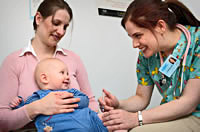NOTE: These priority groups are no longer applicable to H1N1 vaccinations.
It is recommended that all persons 6 months of age and above be vaccinated for H1N1. There are no restriction on who is eligible to be vaccinated. (June 9, 2010)
Priority populations
(Updated August 19, 2009)
The Centers for Disease Control’s (CDC) Advisory Committee on Immunization Practices (ACIP) is a panel made up of medical and public health experts. On July 29, 2009, the panel made recommendations on who should receive the H1N1 vaccination when it becomes available.

The most notable difference in these recommendations from those for seasonal flu is the recommendation for adults 65 years of age and above. The panel recommends that people in this age group receive the H1N1 vaccination after those groups listed below have gotten the vaccine. The panel based its recommendation on observations and studies of how H1N1 influenza affected various age groups and how it spread since it first emerged this past spring. The highest number of H1N1 cases was in school age children and the highest hospitalization rates were among 0–4 year olds.
|
| Population Group |
Prioritized Group:
Yes / No* |
Reason |
| Pregnant women |
Yes |
because they are at higher risk of complications and can potentially provide protection to infants who cannot be vaccinated; |
| Household contacts and caregivers for children younger than 6 months of age |
Yes |
because younger infants are at higher risk of influenza-related complications and cannot be vaccinated. Vaccination of those in close contact with infants less than 6 months old might help protect infants by “cocooning” them from the virus; |
| Healthcare and emergency medical services personnel |
Yes |
because infections among healthcare workers have been reported and this can be a potential source of infection for vulnerable patients. Also, increased absenteeism in this population could reduce healthcare system capacity; |
Children from 6 months through 18 years of age, and
Young adults 19 through 24 years of age |
Yes |
age 6 months–18 years, because we have seen many cases of novel H1N1 influenza in children and they are in close contact with each other in school and day care settings, which increases the likelihood of disease spread, and
age 19–24 years, because we have seen many cases of novel H1N1 influenza in these healthy young adults and they often live, work, and study in close proximity, and they are a frequently mobile population; |
| Persons age 25 through 64 years who have health conditions associated with higher risk of medical complications from influenza. |
Yes |
because they have health conditions associated with higher risk of medical complications from influenza. |
| Persons age 25 through 64 years with NO high risk health conditions |
No |
Once the demand for vaccine for the prioritized groups has been met at the local level, programs and providers should also begin vaccinating everyone from the ages of 25 through 64 years. |
| Persons age 65 years or older |
No |
Current studies indicate that the risk for infection among persons age 65 or older is less than the risk for younger age groups. Once vaccine demand among younger age groups has been met, programs and providers should offer vaccination to people 65 or older. |
*SOURCE: CDC Website
Additional information on priority groups is available on the NYSDOH Website.
Tompkins County Plans
The Tompkins County Health Department is providing the H1N1 vaccine as available. It will follow the CDC recommendations for vaccination of groups that are most at risk for complications from H1N1 vaccine. Call 607-274-6609 for information.

